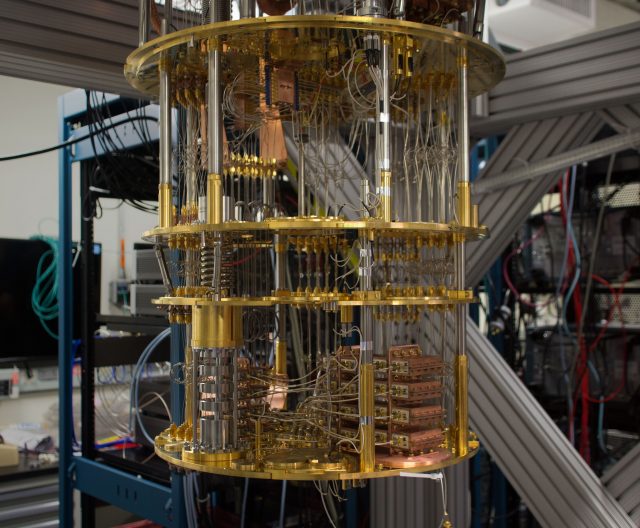Fear the Man in the Middle This company wants to sell quantum key distribution Ars Technica

When reviewing the WireGuard VPN closing fall, one of the things that came up turned into WireGuard's assist for an non-obligatory, additional PSK (Pre Shared Key) layer of safety. Like most modern crypto, WireGuard's basic encryption is asymmetrical, that means you encrypt the records with one key and decrypt it with any other. PSKs, by way of evaluation, are symmetric cryptography—the identical key used to encrypt the statistics is also used to decrypt it.
The fundamental hassle with symmetric cryptography is realistic, no longer mathematical: how do you get the key to your communication accomplice within the first location? The whole reason you need the encryption is due to the fact you do not trust the medium in between you and your partner, so you can't use that medium to share a key. The ever-present worry is that an MITM—Man In The Middle—will intercept the key, destroying your secrecy.
That pitfall is what makes asymmetrical cryptography—the sort used for the whole thing from SSH keys to SSL/TLS for websites to you call it—so appealing. With uneven cryptography, you ship your public key in your conversation partner within the clear. Your accomplice encodes a message together with your public key, which you could then study together with your private key due to the fact that changed into never shared. You can do the equal element in reverse to ship facts the opposite manner—get your companion's public key, and use it to encrypt a message to send to them to be decrypted with their personal key.
So inside the US as a minimum, companies are beginning to sprout up hoping to facilitate this type of cryptography for others.
The quantum computing bogeyman
This simple idea—negotiate a connection and an ephemeral PSK using uneven cryptography—has been serving the world extremely well for a couple of many years now. The tech global could have trouble functioning without it, in reality. Secure cutting-edge communication is handiest viable because we don't want to satisfy conversation companions in character to furtively surrender a PSK like thieves inside the night time. But there may be an uncongenial spectre (no, no longer that Spectre) looming on the horizon: quantum computer systems.

Like quantum physics itself, quantum computers are weird beasties that pretty few human beings absolutely recognize. Conventional computer systems are themselves virtual however perform on basically-analog principles. If there may be a enough quantity of charge on one side of a gate, it qualifies as a one; if there is not, it qualifies as a zero. Presto, we have bits!
Quantum computers do not perform with classical bits at all, they as an alternative shop and procedure facts inside the form of qubits. Instead of a exceptionally macro first-class like "how many electrons are on the alternative aspect of this gate," a qubit is measured via the nation of a single quantum particle. For example, a quantum pc might store qubits inside the spin of character electrons, encoding a 0 as "spin down" and a 1 as "spin up." Things best receives weirder from here—wherein a classical bit can handiest save a single 0/1 price, a qubit can shop a coherent superposition of values. This manner you may keep two bits in a unmarried qubit the usage of superdense encoding, assuming you may make use of a pre-present entangled nation between Alice and Bob (the sender and the recipient of your qubit of data). It also method which you can't in reality understand the price of your qubit with out destroying your qubit (so I wish you've got a pen and pencil accessible to jot down it down whilst you do read it).
Let's go back for a second to that concept of storing a "coherent superposition of values." Scientific American explained this pretty accessibly some years ago, and Ars has been exploring the concept on the grounds that 2008. Remember Schrödinger's Cat, the negative beastie trapped in a field with out a airholes, neither alive nor dead till some ghoulish researcher opened his container to find out? This seems to be a quite honest representation of a qubit. When you simply measure a qubit, you could simplest get a 0 or a 1 out—the cat is both alive, or lifeless. However, you could manipulate the probability of the cat's survival at once. You can store a cat with a 75 percent probability of survival inside the field; whilst you open it up, you still only get a nil or a 1 (lifeless cat, or stay cat). But the likelihood of that 0 or 1 could be very real, and it is really stored in that qubit. (Trying to make realistic use of probabilistic data garage is, frankly, beyond me. But it seems no one asked me to build a quantum computer.)

In strictly practical terms, quantum computers are particularly analogous to GPUs—they may be now not always better at the whole lot than conventional, widespread-motive CPUs are, but they are fantastically higher at sure operations. In precise, quantum computers are clearly, without a doubt good and classical computer systems are genuinely, absolutely horrific at factoring very massive integers. Many of the most broadly-used uneven crypto algorithms rely upon this weakness of classical computer systems to preserve the encryption uneven. Once quantum computers scale as much as around 1,500 qubits, it becomes realistic to use Shor's Algorithm to assault contemporary RSA, Diffie-Hellman, and elliptic-curve schemes immediately and in real time. (This means the eventual doom of Bitcoin, in addition to modern SSL/TLS schemes.) IBM made news a year ago with a 50-qubit version in their Q quantum computer systems, so this in all likelihood might not happen the next day, or the day after... But it appears inevitable that it will appear.
Quantum computers are also better at attacking symmetric cryptography, but now not sufficient to matter. You can cut the time to attack a symmetric algorithm in half the use of a quantum laptop, but one little bit of entropy isn't some thing to write domestic about. There also are a few uneven crypto algorithms that don't rely on factoring large integers. As a long way as we recognize nowadays, they are not mainly liable to attack by using quantum pc, both. The quit of mathematically-derived crypto isn't right here quite but... But it's surely time to begin thinking about new ways of attaining secrecy over lengthy distances.
//arstechnica.com/devices/2019/04/fear-the-guy-in-the-center-this-agency-wishes-to-promote-quantum-key-distribution/
2019-04-28 thirteen:00:00Z
CBMid2h0dHBzOi8vYXJzdGVjaG5pY2EuY29tL2dhZGdldHMvMjAxOS8wNC9mZWFyLXRoZS1tYW4taW4tdGhlLW1pZGRsZS10aGlzLWNvbXBhbnktd2FudHMtdG8tc2VsbC1xdWFudHVtLWtleS1kaXN0cmlidXRpb24v0gF9aHR0cHM6Ly9hcnN0ZWNobmljYS5jb20vZ2FkZ2V0cy8yMDE5LzA0L2ZlYXItdGhlLW1hbi1pbi10aGUtbWlkZGxlLXRoaXMtY29tcGFueS13YW50cy10by1zZWxsLXF1YW50dW0ta2V5LWRpc3RyaWJ1dGlvbi8_YW1wPTE
0 Response to "Fear the Man in the Middle This company wants to sell quantum key distribution Ars Technica"
Post a Comment